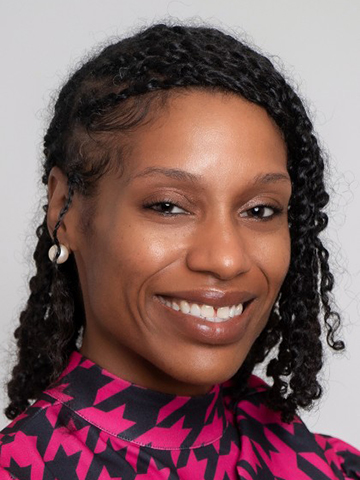Darleesa Doss, Ph.D., M.P.H., CHES Joins SLU Behavioral Science and Health Equity as Associate Professor
The Saint Louis University College for Public Health and Social Justice has named Darleesa Doss, Ph.D., M.P.H., CHES, an associate professor in the Department of Behavioral Science and Health Equity.
Doss earned her Ph.D. in Health Behavior and Master of Public Health from Indiana University-Bloomington. She joins SLU after 10 years of teaching as an associate professor at Indiana State University (ISU), and most recently was the director of the Bachelor of Sciences in Public Health program at ISU.

Her research interests primarily focus on subjects including addressing racial/ethnic health disparities; overweight and obesity prevention strategies; improving health behaviors among underserved populations with an emphasis on physical activity and nutritional behaviors; health promotion education; and maternal and child health.
“Growing up in an underserved community with a disproportionate burden of poorer health outcomes, as well as witnessing the negative impact of various chronic health conditions and premature deaths among family and community members, sparked my interest in working in public health," Doss said. "I developed a deep desire to address racial and ethnic health disparities in communities similar to my own. For example, my extensive public health education and professional experience have enabled me to conduct several qualitative and quantitative research studies to address persistent emerging issues affecting health outcomes in underserved communities.”
Some of her publications and research articles have been placed in the Journal of Community Health, the Health Behavior and Policy Review, the American Journal of Health Promotion, and Pedagogy in Health Promotion: The Scholarship of Teaching and Learning. Topics include youth sports participation during the COVID-19 pandemic, the association between seeing people walk and neighborhood social cohesion, gender differences in the association between alcohol use and sedentary behavior among adults, and approaching the areas of responsibility and competencies for health education specialists.
"I learned the importance of building strong professional networks, both in the field of public health and within the communities that I serve.”
“I will say that early on in my career, I learned the importance of building strong professional networks, both in the field of public health and within the communities that I serve,” she said. “I have had the opportunity to collaborate on various innovative public health projects, conduct research, and learn new skills, all of which continue to be instrumental in my career.”
At SLU, she will teach (BSH 5400: Assessment, Intervention Development (AIDE) 1) and (PUBH 5010 Mission and Practice of Global Health).
Doss draws from her greatest accomplishments and support system to mentor students from similar backgrounds.
“It is truly rewarding to be in a position that allows me to share my experiences and offer support and guidance to students as they transition into this wonderful space in higher education," she said. "Notably, I must say that I am equally proud to have the opportunity to serve in communities where I am welcomed to share my knowledge, provide health education and provide resources to those in need. I have had the opportunity to provide education, conduct research, and develop and implement public health interventions/programs in various communities. Witnessing the impact of my work in these communities will always remain a major accomplishment in my professional career.”
Doss has had appointments, memberships and roles with the American Public Health Association (APHA), the Indiana Society for Public Health Education (InSOPHE), and the Society for Public Health Education (SOPHE). She has also done community work and service as the president of the Indiana Society for Public Health Education (InSOPHE) and was a board member of the Minority Health Coalition.
As her career goes on, Doss continues to focus on addressing various health concerns in underserved communities.
“As I dive deeper into my COVID-19 research, I am most interested in investigating the long-term effects of COVID-19 on racial/ethnic communities, which remains critical for the development of culturally appropriate interventions,” she said.
Doss is looking forward to working with SLU students, faculty and staff.
“The new position offers an exciting opportunity to contribute to public health by teaching and mentoring our future professionals. I am looking forward to collaborating with colleagues in BSHE and CPHS to not only share my ideas but also learn from their expertise in the field,” she said.
College for Public Health and Social Justice
The Saint Louis University College for Public Health and Social Justice is the only academic unit of its kind, studying social, environmental and physical influences that together determine the health and well-being of people and communities. It also is the only accredited school or college of public health among nearly 250 Catholic institutions of higher education in the United States. Guided by a mission of social justice and focus on finding innovative and collaborative solutions for complex health problems, the college offers nationally recognized programs in public health and health administration.